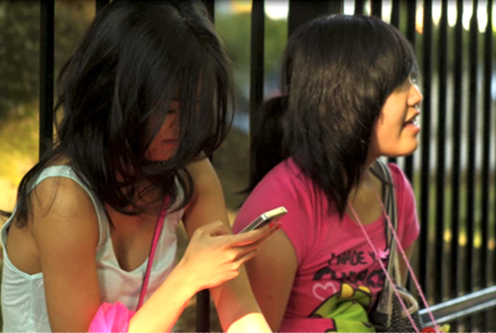
(Photo: M.Andersen)
Portland is one of 77 cities around the country that have put in for a one-time federal ‘Smart City’ grant that’s looking to promote big ideas about urban mobility.
An award is a long shot — only one city will get the $50 million prize — but the city’s application (which wraps together a wide variety of concepts for improving and integrating digital transportation data) is an education in itself, offering various details about the city’s vision that we haven’t seen publicly until now.
“For years, I drove to work downtown because I thought it was faster. A colleague showed me UB Mobile PDX and I started to think differently about my commute.”
— Testimonial from fictitious character in City’s grant application
Here’s one: The city is pretty far along in the process of envisioning a single all-purpose “marketplace” that would let smartphone users book and pay for trips by Biketown, TriMet, car2go, Spinlister or Lyft in the same app. Under the vision described here, the city could also integrate parking payments and even the pay-per-mile fee that’s been tested by the Oregon Department of Transportation as a replacement for the gas tax.
The theoretical app would let users weigh their options based on costs, travel times and other factors like carbon emissions.
A mobile app, though, would only be part of the benefit of the integrated system described here and dubbed “Ubiquitous Mobility for Portland” or (are you ready for this?) “UB Mobile PDX” for short.
Most of the programs would be almost invisible to the public, but it’d be working behind the scenes to enable big improvements to the city’s transportation system.
What the new system would do
The best way to understand the concept is probably to consider the cheesy but concrete “testimonials” from fictional residents that the city has put in the margins of its application.
As a working parent, getting the kids to daycare and myself to work on time is a constant struggle. With UB Mobile PDX, I can quickly find the fastest and cheapest option — especially on those days when I clock out late or traffic is bad.
I deliver freight to restaurants all over the city. UB Mobile PDX tells me the best route for the day and where I can find parking. Predicting where traffic isn’t has allowed me to add five more stops to my route each day and reduced the mileage fee that my company pays.
I am a transportation engineer at the City. With UB Mobile PDX, I use real time data from our own fleet vehicles to improve system efficiency. Little changes make a big difference — these changes made three planned intersection widening projects unnecessary.
For years, I drove to work downtown because I thought it was faster. A colleague showed me UB Mobile PDX and I started to think differently about my commute. Turns out, Portland has many great options and riding MAX is actually faster than driving at rush hour. I love seeing the dollars saved add up in my app.
At my age, driving isn’t easy, and the walk from the bus stop home can be daunting. With UB Mobile PDX, I don’t have to stay home. I can easily call a rideshare to pick me up from a bus stop and take me to my front door. The information — and volunteer who taught me to use it — has given me my freedom back.
I walk everywhere in my neighborhood, but sometimes wish the streets were safer. I know UB Mobile PDX is the first step in getting cars and trucks that warn drivers of potential crashes with pedestrians onto our streets. I can’t wait for a future when more people use this technology and pedestrian fatalities are a thing of the past.
Advertisement
Tilkum Crossing test area could be a test zone for self-driving transit
Last month we wrote about the possibility that self-driving cars threaten to wreck our transit system unless we also get self-driving buses that would greatly cut the cost of operating transit.
Portland’s proposal inches toward that possibility by creating “autonomous transportation pilot zones”:
UB Mobile PDX will provide the means by which autonomous vehicles can become mainstream. We have no doubt manufacturers will successfully solve technical issues, but there remains the issues of acceptance and adoption. To aid in this transition, Portland proposes to establish autonomous transportation pilot zones, beginning academic and institutional campuses, as well as a driver-assistance and collision-avoidance bus and train line on the new car-free and multimodal Tilikum Crossing.
This test of autonomous vehicles is presumably the “first step” toward zero fatalities referred to in the final testimonial above.
Bikeshare system plans to use ‘variable pricing and gamification’
When it launched, car2go kept its cars fueled by offering discounts to people who filled them with gas.
Similarly, Portland’s forthcoming Biketown system is planning to (eventually) keep its bikes distributed by offering discounts to people who end their trips in key destinations, like the tops of hills or the downtown core at 4 p.m.
In partnership with SoBi, Motivate, and Nike, PBOT is working to create an App that will not only give users real-time data on the location of the bike, but also include real-time route finding. It will be the most technologically advanced App on the bikeshare market. Portland will be the first city to introduce variable pricing and gamification to its bikeshare with the technology on the bike. Instead of rebalancing the bike system with trucks, Portland will use pricing and incentives, thereby reducing the overall carbon footprint of the bikeshare system.
City, state and port are laying the groundwork for “congestion pricing or tolling”
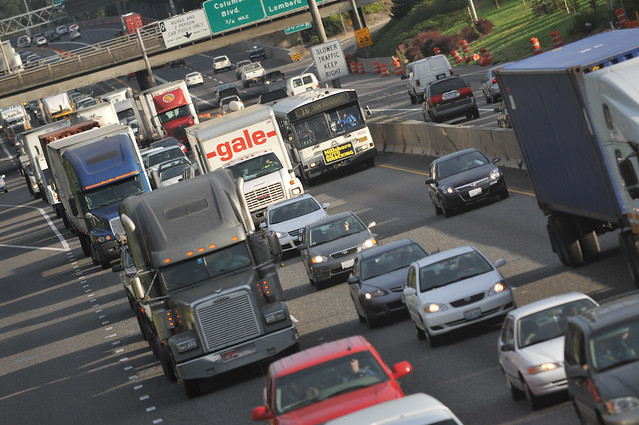
Here’s another tidbit has yet to be reported anywhere.
The City of Portland, in partnership with the Port of Portland, Metro, ODOT, and private sector freight and logistic industry stakeholders, is embarking on a Smart Freight Regional Strategy to facilitate the more efficient movement of goods, employees, and container services. The Strategy is focused on creating a coordinated and comprehensive data hub within various transportation services providing for the following:
• Intensive intelligent transportation system (ITS) management of key freight routes
• Congestion pricing or tolling on key freight corridors
• Facilitated cargo, container, and freight services into and out of the Port of Portland’s
aviation, marine, and industrial properties and along regional truck routes
• Coordination of port cargo schedules and rail schedule data
Congestion pricing is probably better described as decongestion pricing because that’s what it does: unclogs crowded roads by charging people to drive on them, so the only people who do are the ones who truly need to do so.
This is the only known way to control auto congestion over the long run, and it’s the force behind the transformation of central London that is about to see bikes outnumber cars during rush hour.
Application’s success depends on culture of cooperation
The idea of a single integrated mobility app isn’t revolutionary, but its existence would be. That’s because letting our many separate digital transportation databases talk to each other is much easier said than done.
If Portland has a shot at this, it’ll be because we’ve made a case that our cultural commitment to open data — such as GTFS, the transit data standard that TriMet co-created with Google and has now enabled transit apps across the country — has set us up to succeed.
If Portland selected as one of five finalists nationwide, it’d get $100,000 and a few more months to offer more concrete details about just how this would work.
Correction 1:20 pm: An earlier version of this story inaccurately said car2go offers free minutes to people who refuel cars. It launched with that system but no longer uses it.
— Michael Andersen, (503) 333-7824 – michael@bikeportland.org
BikePortland can’t survive without paid subscribers. Please sign up today.



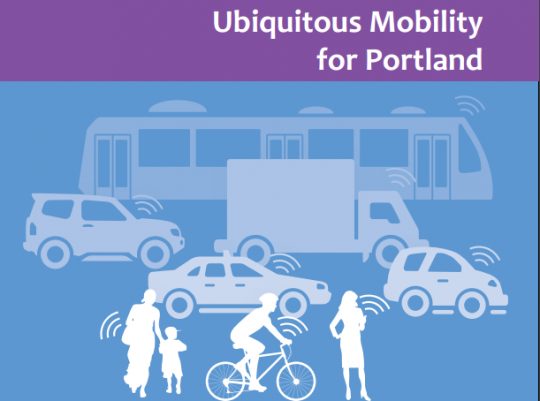
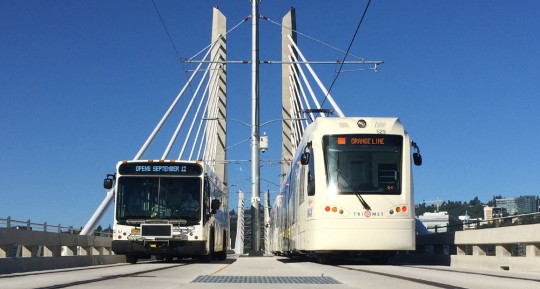
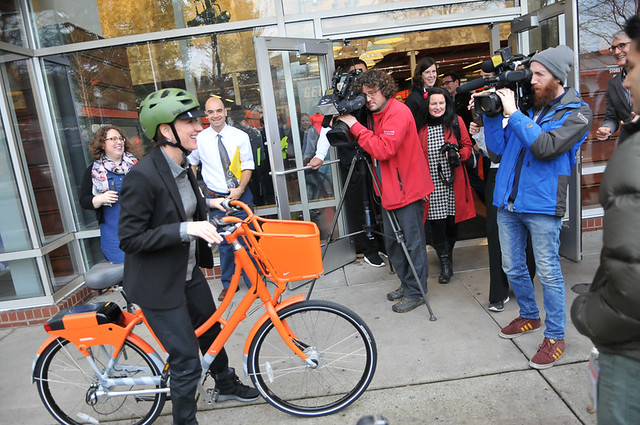
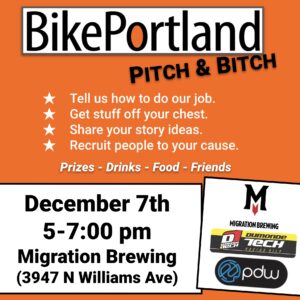


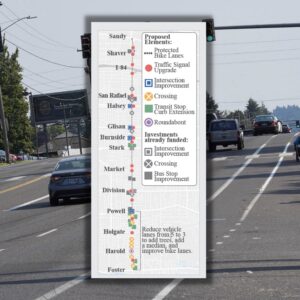
Thanks for reading.
BikePortland has served this community with independent community journalism since 2005. We rely on subscriptions from readers like you to survive. Your financial support is vital in keeping this valuable resource alive and well.
Please subscribe today to strengthen and expand our work.
If anybody’s wondering, the practical reason why there’s no Uber support is because apps using this WONDERFUL company’s API are not allowed to support other services.
I did wonder. Thanks for the info.
Well, I’m impressed.
I mean, yeah, Portland isn’t exactly famous for executing on big visionary plans these days, but the ideas in this proposal are really exciting.
This idea of “ubiquitous mobility” made me think of former PBOT Director Tom Miller’s idea of “true choice” which he defined during the 2011 Transportation Safety Summit as:
The maintaining of efficiency for motor vehicles is a useless pursuit. Any gains by trying to improve this efficiency are quickly erased by induced demand, all while stomping out all other modes of transport and destroying neighborhoods. 60+ years of chasing our tails has shown this to be true. Efficient car travel cannot co-exist with efficient biking, walking, and public transport. The only solution is to reclaim space given over to cars for other modes and make the personal costs of driving equal to the social costs.
Yeah, every bit of the UB mobile testimonials just sounded like induced cut-through traffic. The last one makes me think you will not be allowed to cross the street without a smartphone.
Jonathan, FYI, car2go no longer gives free minutes to re-fuel the vehicles. They handle that internally now…which was a little disconcerting to me the other day because I was running a bunch of errands on fumes in one of their cars
My mistake! I’ll fix.
A good idea but…have mercy on the Luddites!
Signed,
Happy Appless
p.s…also worried that the “Smart Freight Regional Strategy to facilitate the more efficient movement of goods, employees, and container services” means dooming a few select streets (over my dead body, re: SE 26th) to freight hell. Sorta like the narrowed flight paths that are hammering certain communities across the US in the FAAs switchover to GPS.
have mercy on the Luddites!
Signed,
Happy Appless
Government, unlike private corporations, has to take all users into account. To this day, the City’s e-government websites and tools are the crap they are in part because we spent so much energy and money in the 2000s continuing to support the non-computered while trying to come into the 21st century technologically. We couldn’t just “deprecate” phone calls, walk-in service, taking checks, etc.
Now that smartphones and apps are approaching ubiquity, governments should be leveraging them as soon and as thoroughly as possible. Should they leave old pathways of access open? Sure, for as long as needed. Should they spend resources trying to give the opt-outs the same level of convenience as the new technology allows? No.
Money would be better spent supplying the poor with smartphones, frankly.
I am a bit wary of moving to smartphone-only for public transport, but only for the reason that my phone always seems to die when I need it most. Chip cards for payment never need recharging.
Or bad connections. Yeah, I’ve had both, and agree. But I don’t think anyone’s suggesting smartphone-only. Something like London’s Oyster Card, which you can recharge via smartphone app (as well as in every corner shop, newsstand and ATM), would be a good way to go.
And even in London, they still accommodate cash-paying transit users (like this tourist). But it’s decidedly less convenient for the user, and more expensive for the system.
Agreed! TriMet is working on our version of the Oyster Card and it would be great to see it used for all modes of public transport in the region, including bike share, Amtrak, and regional buses (e.g. buses to the coast, Mount Hood, etc.)
Great vision, and I’d love to see it happen. In the context of this discussion, about accommodating “Luddites”, however, we aren’t just talking about paying fares. The proposal includes checking availability, scheduling, arrival times, comparing trip options, etc.
And the idea of somehow deploying that level of convenience to those who opt out of smartphone use…well, it would be impossible. Kiosks of some sort would be the only way to give those users some of the data.
Agreed, kiosks would get expensive. Smartphones provide an excellent opportunity to augment core services, but should not be a requirement for use.
Yes, but if the system envisioned in this article is faster, better, cheaper, and full of advantages for users and providers, then we’d want as many people to use it as possible.
I don’t see anything wrong with discouraging the use of older, more expensive legacy systems through pricing and inconvenience. (Always assuming some kind of coverage for the poor.)
Kind of like gas taxes and congestion pricing: discouraging choices that we don’t really want a lot of people making.
I still write checks, too, Anne. 🙂
With apologies for straying a bit from the theme, and in explanation, I opted out of smart phones and the social media juggernaut (w/ one exception) because I’m a songwriter and I worried my concentration was being blown to smithereens and my brain and energy, instead of taking thoughts and ideas to the old “i’ll write about this” arena, leaping instead to “I can post this on FB!” Bright! Shiny! Instant reward! Likes! Likes! Likes! Pellet, please! I didn’t want to lose my ability to think deeply and focus, and I was losing it.
I know only a handful of people who’ve resisted falling into deep thrall to their smartphones. I don’t have one because I know I’m no different–I will become that monster I hate seeing everywhere, eyes glued to the phone, juicing up on “likes!” and instant validation, looking up things instead of trying to remember them in brain. Believe me–I miss the convenience (and esp. the recording app, a real boon to musicians). But I fear people are losing their brains–the superpowers of concentration, and memory.
I get what you’re saying, and it’s true. But I wish it wasn’t such an all-consuming juggernaut, technology now, and that it was easier for people to opt out without having to accept becoming outcasts.
You’ll never hear me say that anyone should be literally forced into smartphone use, or anything else that they deem a form of thralldom.
I belong to one or two self-selected minorities myself. There’s always some price to pay.
Didn’t think for a moment I would (hear you say)! 🙂 I don’t think it’s thralldom for everyone, but the human brain is wired in such a way that it is for a vast majority. My husband has no problem at all putting the phone down (and has never had the slightest interest in social media, apps, etc.). But I’m of a little more obsessive ilk and need to draw a hard line for self. 🙂
UB Mobile PDX seems like a very clumsy name to me. You can’t even shorten it in your mind without it sounding like a comic-book villain: Ubmopdx? Umpidix?
I’d almost rather have a cutesy name like Siri or Alexa. Or, you know, “Raindrop” or some damn thing.
Or Hop?
Just UB Mobile, drop the PDX part for better flow
They are going to get all that done with a $50 million? I wouldn’t get my hopes up. This reads like one of my failed job applications. We will be lucky if they manage to install a couple traffic lights (at the cost of bike lanes) and some swinging gates out of the money.
Then why can I see Uber cars in my Transit App? (And not Lyft, for that matter, which is annoying since I only use Lyft…)
Portland is one of the 7 finalists and has been awarded $100K to finalize their proposal which is due May, 2016, with a decision in June.
I believe Portland will have its toughest competition with Austin, which has Google Autonomous Cars, Google Fiber, a testbed for 5G wireless with AT&T, lots of tech companies like Dell, and software expertise.
Portland has Intel’s 5G wireless initiative with Ericsson and AT&T, Google Fiber, Jaguar/LandRover’s incubator, Daimler/Freightliner headquarters, Pangea’s electric bus, GlobeSherpa (bought by an Austin company) and Cargo’s software.
I propose an autonomous corridor between PSU and OMSI. Later, the I-5 congestion problem could be tackled with an autonomous link between Vancouver and the Yellow Line at the Expo Center.
http://www.hayden-island.com/self-driving-car-proposal
Sam Churchill